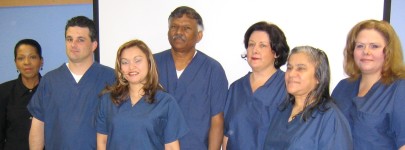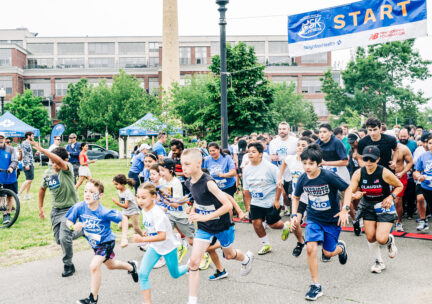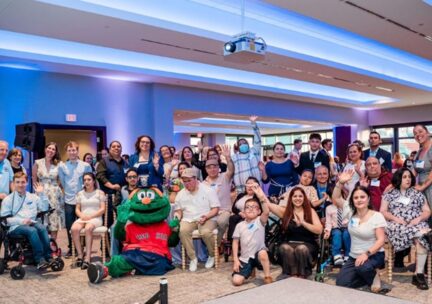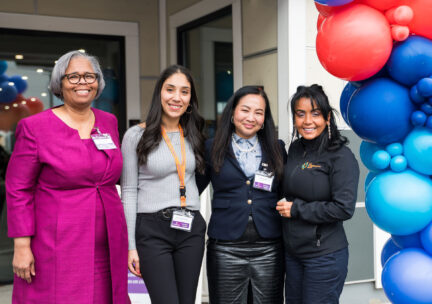First CNAs graduate from Education & Training Institute
East Boston, MA, June 15, 2006—How much can six students accomplish in six weeks? Knowledge, experience, and a new career in a growing field, as a group of residents from East Boston and surrounding communities recently discovered when they enrolled in a course for Certified Nursing Assistants (CNAs) at the Education & Training Institute of the East Boston Neighborhood Health Center (EBNHC).
A pilot program in partnership with the American Red Cross of Massachusetts Bay, this course prepared students to provide care for elders and other residents of nursing homes, as well as those in hospitals and home care. As primary caregivers, responsible for the day-to-day monitoring of patients’ overall health and wellness, CNAs are essential members of medical teams that include nurses, dietitians, and doctors. They measure and record vital signs; help residents stay active; assist them in eating, bathing, and dressing; and keep the medical team informed of patients’ mental, physical, and emotional conditions.

During the course, students learned about medical conditions common to elderly patients and practiced infection control procedures and range of motion exercises. “Nursing 101, we call this course. No medical background is required,” said Marianne Mastrangelo, RN, Director of Health Care Training for the American Red Cross of Massachusetts Bay.
The students soon found that communication and sensitivity skills were as important as clinical skills. “The CNA may be the only person who socializes with the patient on a daily basis,” said Tessie Baxter, RN and Red Cross instructor. “Compassion is essential. We teach CNAs to let patients know through the care they give that while someone may be in a nursing home, their life still matters. Patients’ health relies on knowing they are valued.”
After completing the classroom portion of the course, students practiced their new skills at the Don Orione Nursing Home in East Boston. Working with staff, students were each assigned the care of one resident, and over the course of a week became familiar with their residents’ needs and abilities. Lorraine described her charge: “She’s cute, 92, from East Boston. She’s very independent, and even brushes her own teeth.” Observing the students’ growing fondness for the residents, Nurse Baxter commented, “CNAs become like extended family members to the residents. They feel very protective.”
Lorraine agreed, “People need people. It’s that simple. They need people to show them love and affection, not just bathe them and brush their teeth. You make a decision to love them, and you can’t do this job unless you love them.” Nurse Baxter smiled, adding, “We need people who have the heart to do this work. I’m sure there are many people in the East Boston community who have that kind of heart.”
On graduation day, the EBNHC management team and representatives from the Red Cross and Senator Ted Kennedy’s office celebrated with the students and their friends and family at a luncheon at the Education & Training Institute. The graduates received their certificates, and praise from their teacher. “I’m so proud of this class. In ten years of teaching this course, I’ve never had a class work so hard before,” said Nurse Baxter.
Jack Cradock, CEO and President of EBNHC, addressed the group. “This is larger than you know. The need in health care is vast. Our goal is to train our own to fill that need, and this first CNA course at the Institute is a part of that effort. As the largest employer in the community, we have that responsibility. Great things happen at EBNHC every day, and this is one.”
James O. Taylor, Chief Medical Officer of EBNHC, also attended the graduation luncheon. “The CNA program is wonderful for everyone. It’s important for EBNHC, because we really need well-trained employees. It’s crucial that our people come from the community. And it’s good for the participants because it’s an entry into a job that can be a first step in advancement in the health care field, an advancement that we will continue to support.”
As the U.S. population ages, the need for skilled and compassionate CNAs climbs, with an estimated 19,800 CNA jobs to be created nationwide by 2008. “There will always be jobs for CNAs because there will always be people who need care,” said Nurse Baxter. In a job with both security and growth potential, CNAs often continue their training to become supervisors and medical assistants in doctors’ offices and hospitals.
Concluding the graduation celebration, Liliana Silva, Director of the Education & Training Institute, addressed the students. “You were our pioneer class, and you opened a pathway to opportunity for others. Once you’ve been a part of the Institute, you’re always a part of the Institute. You’re family now, and we hope you’ll come back.”


